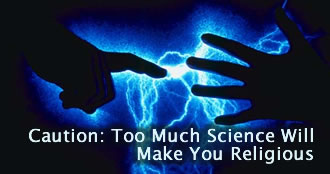
Before birth, a baby lives in its mother's womb surrounded by water. It doesn't breathe. Its lungs are collapsed, folded between the two upper chambers of the heart. There's a hole in its heart so the blood circulates. And there's a tube connecting the aorta to the pulmonary artery.
Within ten minutes of birth, its lungs have to expand, the hole in its heart has to heal, the tube has to seal off.
In fact, 67 different steps have to happen in sequence so that the baby can go from a creature that lives in water to an oxygen-breathing baby. Miraculously, these things take place routinely every minute of every day.
That is science, when we understand what happens. And we know that no human being or scientist could have developed or engineered this sequence. If a company tried to build it, it wouldn't work.
Indeed, if we knew what goes on in our very own lives, if we knew what goes on in the birth of a baby, we would get on our knees and thank G-d forever. All of the vast scientific studies that have been made over the past hundred years keep pointing to the concept of order and sequence, and therefore, in my opinion, a creator.
A professor of mathematics came into my study one day. He was a real atheist, agnostic. He said to me, "I've just calculated that it's impossible to have the human eye evolving in the five billion years that they give us." He said, "The person who believes in evolution, that is the person making the leap of faith."
ABCScience doesn't contradict the Torah. Science teaches us that when the Torah says, "I have created the world," "I will care for you," "I will heal you," and "I will provide," you know what? G-d was right. 1998 is the first time in human history that enough food has been grown to feed every living person on the planet. Theoretically, no one on this earth should have to starve. And there's a statement in Psalms that says, "You open your hands and you give to all living things its need." G-d has provided. And that's what science says. When a baby is born, you know what? He was right. And science says that when the doctor heals a patient, you know what? He was right. G-d has provided.
There has never been a rabbi who has ever said to a scientist, "stop searching." There's never been a rabbi who has said to him, "quit looking." Because the ultimate believer of truth, and the Torah is all truth, will ultimately believe that anything you find in nature that is true will reflect and react to the glory of G-d.
When I was younger, I worked for the NASA program. And I looked for life on Mars. We spent hundreds of millions of dollars looking for life on Mars-for which, if you haven't been thanked as taxpayers before, let me thank you. During that time I asked the Lubavitcher Rebbe, "Is this right? Can I really do this? Other religions say you shouldn't search. And the Torah doesn't say there's life on Mars." The Rebbe replied in Yiddish, "Professor Green, you should look for life on Mars. And if you don't find it there, you should look elsewhere. And if you don't find it there, you should look elsewhere. Because for you to sit here and say that G-d didn't create life elsewhere is to put limits on G-d, and no one can do that."
Velvl Greene is Professor of Epidemiology and Public Health at Ben Gurion University and directs the Lord Jacobovitz Center for Jewish Medical Ethics. A former Fulbright Scholar and an original participant in NASA's Exobiology program, he served as Professor of Public Health and Microbiology at the University of Minnesota for 27 years.

